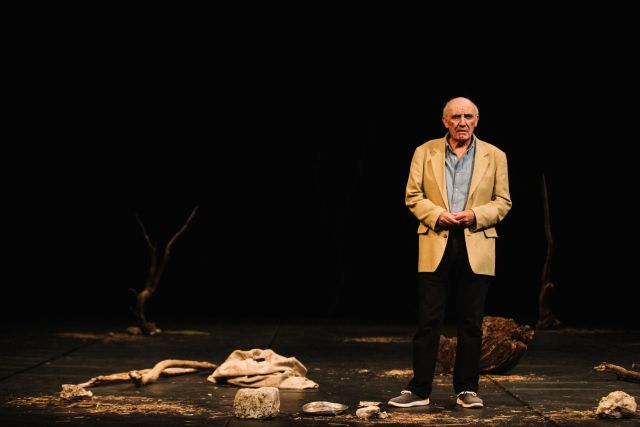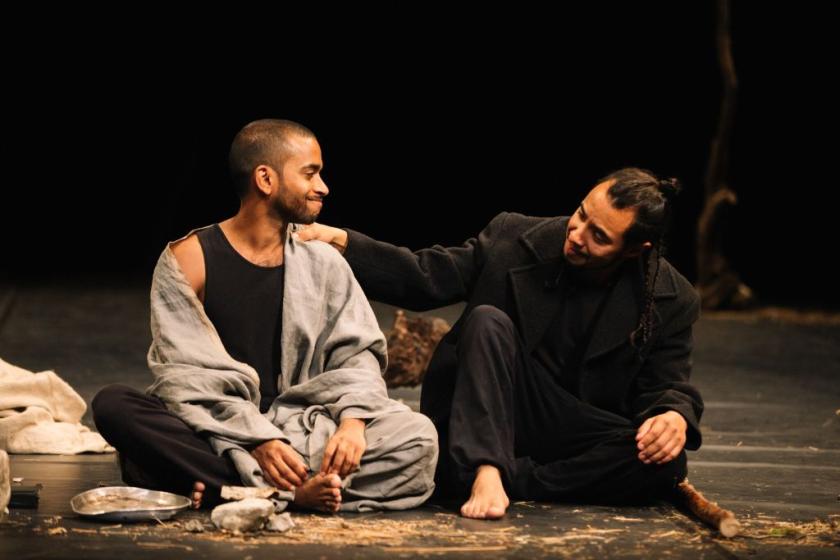Of the Edinburgh International Festival’s three productions by 2018’s resident company, Paris’s Théâtre des Bouffes du Nord, The Prisoner is the most gnomic, the most baffling, and, frankly, the most disappointing. Which is a great shame, of course, because it is also the one possibly most hotly anticipated, being co-written and co-directed by the Bouffes du Nord’s guiding light across several decades: the legendary elder statesman of the theatre Peter Brook who, astonishingly, is 93.
We’re in an unnamed foreign land – judging by the sun-scorched trees, dusty rocks and heat-suggesting lighting, this isn’t Europe. Young Masuvo, after committing an unspeakable crime, receives an enigmatic punishment. He's to sit on a hill overlooking a prison for two decades, and he's forbidden to leave that spot even if passers-by attempt to help him – and a host of them do. He's a prisoner of sorts, though never actually incarcerated. Brook and his longtime co-writer/co-director Marie-Hélène Estienne’s tale unfolds as if it were an ancient parable on guilt, punishment and redemption, an effect heightened by its multinational cast and arid, austere set. Sri Lankan-born Hiran Abeysekera is charismatic as the troubled young man, and the Malian-born, London-based Frenchman Hervé Goffings lends unforced authority to the part of his uncle Ezekiel, who enforces the bizarre punishment. Donald Sumpter (pictured above) makes a self-effacing visitor, sent to interrogate the prisoner, and the Indian stage and film actress Kalieaswari Srinivasan (seen onscreen in Cannes prize-winner Dheepan) is strong, too, as Nadia, the sister Mavuso is attempting to protect.
Brook and his longtime co-writer/co-director Marie-Hélène Estienne’s tale unfolds as if it were an ancient parable on guilt, punishment and redemption, an effect heightened by its multinational cast and arid, austere set. Sri Lankan-born Hiran Abeysekera is charismatic as the troubled young man, and the Malian-born, London-based Frenchman Hervé Goffings lends unforced authority to the part of his uncle Ezekiel, who enforces the bizarre punishment. Donald Sumpter (pictured above) makes a self-effacing visitor, sent to interrogate the prisoner, and the Indian stage and film actress Kalieaswari Srinivasan (seen onscreen in Cannes prize-winner Dheepan) is strong, too, as Nadia, the sister Mavuso is attempting to protect.
But there’s something amiss here. David Violi’s Godot-like set (or “set elements”, as the programme describes it) looks as stripped-down and raw as a theatre set could be. But the stunted branches and piles of sawdust are, of course, just as artfully artificial in their own way as any more modern construction. Likewise the story, though drawing on tropes of ancient myths and archetypal narratives, lacks a clear sense of direction or even forward movement, doubling back on itself in time and shifting narrative perspective confusingly – not to mention digging up troubling issues of incest and abuse without attempting to grapple with their implications.
With an absence of music (soundscapes are evocatively generated by the actors themselves), the show emerges from and returns at its close towards silence, though Philippe Vialatte’s rather restless, overly signposted lighting seems slightly excessive amid the austerity elsewhere.
The work echoes many of Brook’s theatrical concerns since The Mahabharata of the 1980s, and even feels like a satellite to that earlier production, though far more modest in scale and ambition. If nothing else, The Prisoner offers an austere 70 minutes of quiet, thoughtful, slow-moving theatre amid the frenzied energy and garish colours of so much theatre at large elsewhere. But it’s a troubling work all the same, not altogether convincing in its format or its themes and dramatically rather inert.
- This review ran following the premiere of the production at the EIF
- The Prisoner at the National Theatre/ Dorfman to 4 Oct
- Read more theatre reviews on theartsdesk














